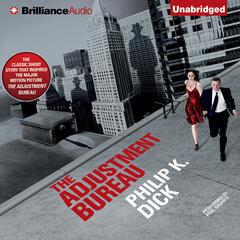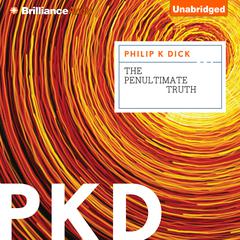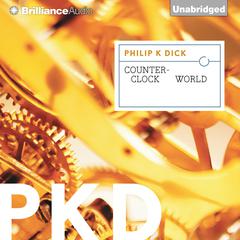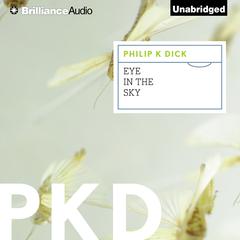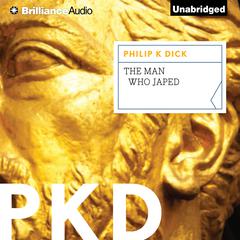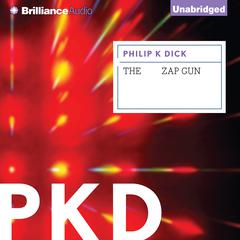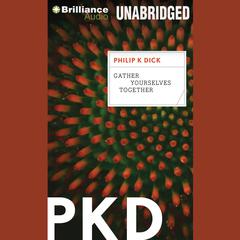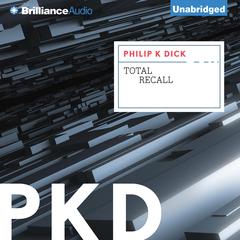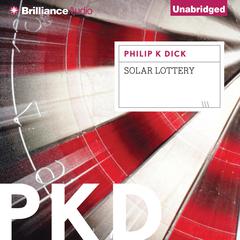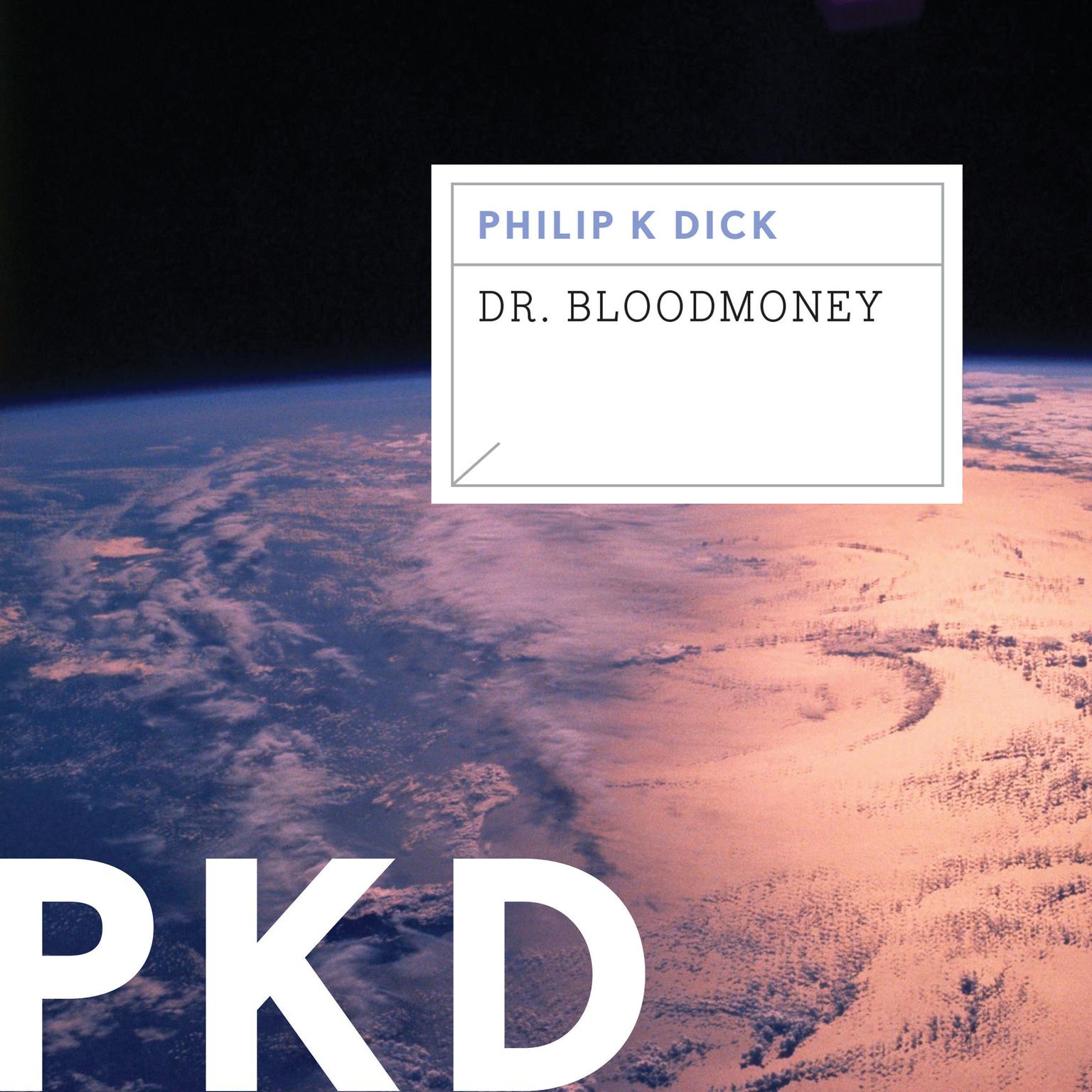 Play Audiobook Sample
Play Audiobook Sample
Dr. Bloodmoney Audiobook
 Play Audiobook Sample
Play Audiobook Sample
Quick Stats About this Audiobook
Total Audiobook Chapters:
Longest Chapter Length:
Shortest Chapter Length:
Average Chapter Length:
Audiobooks by this Author:
Publisher Description
Dr. Bloodmoney is Philip K. Dick's darkly comic riff on Dr. Strangelove, a look at how humanity gets along after the end of the world. This Nebula Award nominee has all the wild characters and twisty science fiction plotting that Dick fans know and love.
"A masterpiece." —Roberto Bolaño
What happens after the bombs drop? This is the troubling question Philip K. Dick addresses with Dr. Bloodmoney, or How We Got Along After the Bomb. It is the story of a world reeling from the effects of nuclear annihilation and fallout, a world where mutated humans and animals are the norm, and the scattered survivors take comfort from a disc jockey endlessly circling the globe in a broken-down satellite. And hidden amongst the survivors is Dr. Bloodmoney himself, the man responsible for it all. This bizarre cast of characters cajole, seduce, and backstab in their attempts to get ahead in what is left of the world, consequences and casualties be damned. A sort of companion to Dr. Strangelove, an unofficial and unhinged sequel, Dick's novel is just as full of dark comedy and just as chilling.
Download and start listening now!
"A post appocalyptic world, where a dying disc jokey floats in space sending news down surviors whom listen to his readings of works of literature, music, and general thoughts. Much more to this book. Each character in the book is trully unique and captivating."
— Nicholas (5 out of 5 stars)
Awards
-
Nominated for the 1965 Nebula Award for Best Novel
Dr. Bloodmoney Listener Reviews
-
" Disappointing and confusing. The whole book is a metaphor I stopped caring about halfway through. "
— Will, 2/14/2014 -
" Even after the bomb drops, people, including mutants, are still people. They have businesses, cheat on their spouses, have petty jealouses etc. This is a brilliant sf classic. "
— Samuel, 2/1/2014 -
" Like always, Philip K. Dick is insane. He prose is plain and unassumingly, but the man's ideas are far beyond that of any sane writer I've read yet. But the characters in all of their dysfunction, even after a nuclear holocaust are all fun and extremely insane. Most have you doubting their actions and thoughts as insanity until, in fact, other characters in the book witness the surreal in real life. It definitely takes you out of convention. "
— Tristan, 1/29/2014 -
" The ending is sooo anticlimactic. You could stop 80 pages before the end and have a fine book. "
— Jared, 1/13/2014 -
" Un po' piatto, ma scorrevole. "
— Norman, 1/8/2014 -
" This was surprisingly compatible with the book I just finished, The Dubliners. It also has made me want to read Of Human Bondage by W. Somerset Maugham. The best thing about post-apocalypse stories are the books that the surviving characters cling to. "
— Danielle, 1/2/2014 -
" What a mind-bender! "
— Drew, 12/17/2013 -
" Not Dick's best work, but still work a read. "
— Ayam, 12/15/2013 -
" There is a DJ trapped in a satellite, who still broadcasts music and books to the war-ravaged earth. Everyone tunes in as he passes overhead. This is the warmest and sweetest of PKD's batshit-crazy books. "
— Will, 12/15/2013 -
" Analisi lucida e spietata di una possibile societ "
— Lbrt, 11/20/2013 -
" this is one of the better dick books. i really liked it. though i tend to like most books about post-apocalyptic times. "
— Lisa, 11/20/2013 -
" My favorite Dick novel I've read. It was surreal at times but didn't make me feel like I was on drugs the way his other books do. "
— Seth, 2/22/2013 -
" A novel discribing life after nuclear holocaust. Like always, Philip manages to capture you with an interesting plot and fleshed out characters. Don't read this as your first PK Dick book. "
— Sten, 11/17/2012 -
" What a shame you can't give no stars. This book deserved it. "
— Roger, 9/21/2012 -
" Odd, but interesting. Bit of a period piece. "
— Sue, 8/15/2012 -
" A work of genius "
— Nick, 6/20/2012 -
" I was in a dystopian mood. Not exactly what I was hoping for. "
— Adam, 5/27/2012 -
" Interesting, but not his best. "
— Stephen, 1/3/2012 -
" A bit long for Dick, and has some of his creepier moments. Dangerfield is a pretty good prototype of the Dick hero in a lot of ways, though (as opposed to the Decker/Joe Chip style Dick protagonist). "
— Peter, 11/20/2011 -
" The premise is interesting, but all the good ideas and parts got lost between characters I didn't care about and elements that were just plain stupid. "
— A, 6/5/2011 -
" I liked the world he created, but just as it started to get interesting toward the end, it petered out. He was also a little too obsessed with phocomelia. I did enjoy the post-apocalyptic bay area he created, though. "
— Jon, 4/20/2011 -
" I just plain didn't like this. The dystopian future post-atomic war was vaguely interesting, but I just didn't buy the weird mutations, bizarre powers and strange motivations of the characters. "
— Cari, 3/10/2011 -
" Post-Apocalyptic Societies even more banal than The Stand. "
— Mr., 3/5/2011 -
" I enjoyed the beginning and middle of the book. The characters and situation were interesting but I felt like nothing much came of it. The book felt like a snippet of these people lives more so than a full plot, I think mostly due to the anticlimactic ending. I felt like "that's it?" "
— Kimmi, 2/18/2011 -
" This book made no goddamn sense. "
— Geoff, 2/11/2011 -
" Post-apocalyptic fun. Not the most coherent, but what PKD book is? "
— Brian, 1/15/2011 -
" Post-apocalyptic Philip K. Dick? Lots of fun. "
— Max, 11/19/2010 -
" I was in a dystopian mood. Not exactly what I was hoping for. "
— Adam, 5/1/2010 -
" Phillip K Dick does Post Apocalyptia! "
— Thirdcoastzed, 4/26/2010 -
" This was surprisingly compatible with the book I just finished, The Dubliners. It also has made me want to read Of Human Bondage by W. Somerset Maugham. The best thing about post-apocalypse stories are the books that the surviving characters cling to. "
— Danielle, 3/8/2010
About Philip K. Dick
Philip K. Dick (1928–1982) published thirty-six science fiction novels and 121 short stories in which he explored the essence of what makes man human and the dangers of centralized power. Toward the end of his life, his work turned toward deeply personal, metaphysical questions concerning the nature of God. Eleven novels and short stories have been adapted to film, notably Blade Runner (based on Do Androids Dream of Electric Sheep?), Total Recall, Minority Report, and A Scanner Darkly. The recipient of critical acclaim and numerous awards throughout his career, Dick was inducted into the Science Fiction Hall of Fame in 2005, and in 2007 the Library of America published a selection of his novels in three volumes. His work has been translated into more than twenty-five languages.
About Phil Gigante
Phil Gigante has narrated more than two hundred audiobooks, earning ten AudioFile Earphones Awards and three of the prestigious Audie Awards for best narration. An actor, director, and producer with over twenty years of experience in theater, film, television, and radio, he is currently the artistic director of Gigantic Productions and Little Giant Children’s Theatre.










